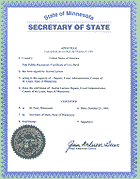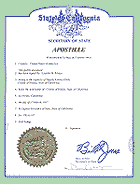
| ADOPTION-UKRAINE Ukrainian adoption agency |  |
What is an apostille and why do I need one?
 |
|
| Example of an apostille (Delaware, USA) |
What is an apostille?
An apostille is a special seal applied by an authority to certify that a document is a
true copy of an original. Apostilles are available in countries, which signed the Hague
Convention Abolishing the Requirement of Legalization of Foreign Public Documents,
popularly known as The Hague Convention. This convention, created in 1961,
replaces the time consuming chain certification process used so far, where you had
to go to four different authorities to get a document certified.
Where can I get an apostille?
Each country party to the Hague Convention designates an authority within its
territory that can issue apostilles. For example, in the USA, it is the office of the
state's secretary. In practice, you should contact a notary to get an apostille. Please
note that some notaries may not be familiar with this procedure - they may propose you an
ersatz that they are more familiar with. If it does not bear the term
"APOSTILLE" in big, that's not it. Also, you don't have to explain why you need
an apostille when dealing with your notary - just tell him what you need. Finally, please
bear in mind that there are some countries that did not sign this treaty yet and thus no
apostilles can be obtained.
What are apostilles normally used for?
An apostille can be used whenever a copy of an official document from another country is
needed. For example for international marriages, adoptions, inheritance, but also for
plain contracts. The apostille is an official certification that the document is a true
copy of the original. It does not certify that the original document's content is correct,
however.
OTHER SAMPLES OF APOSTILLE:


Getting an Apostille in the USA
Who are the U.S. "Competent Authorities" to issue the Apostille
certificate?
A. There are three levels of U.S. competent authorities, one for Federal
agencies, one for U.S. (federal) courts, and one for state documents,
including documents executed before notaries.
1. Federal Executive and Administrative Agencies: Authentications Office,
Department of State, 518 23rd St., N.W., Washington, D.C. 20520, (202)
647-5002 Fee: $5.00. For additional information, call the Federal
Information Centre: 1-800-688-9889, and choose option 6 after you press 1
for touch tone phones. Walk-in service is available from the Authentications
Office from 8 a.m. to 12 noon Monday-Friday, except holidays. Walk-in
service is limited to 15 documents per person per day (documents can be
multiple pages). Processing time for authentication requests sent by mail is
5 working days or less. See also, the State Department home page:
http://www.state.gov/. See also in general, 22 C.F.R.
131.
2. U.S. Courts: Clerks and Deputy Clerks of the Federal Court System. Fee:
$5.00.
For the purposes of the Convention, clerks and deputy clerks of the U.S.
Courts shall include the clerks and deputy clerks of the following: The
Supreme Court of the United States, the Courts of Appeals for the First
through the Eleventh Circuits and the District of Columbia Circuit, the
United States District Courts, the United States Court of Claims, the United
States Court of Customs and Patent Appeals, the United States Court of
International Trade, the United States District Court for the District of
the Canal Zone, the District Court of Guam, the District Court of the Virgin
Islands, and the District Court for the Northern Mariana Islands.
3. States, Territories and Other Jurisdictions: Each state and other
jurisdiction in the United States (District of Columbia, Puerto Rico,
American Samoa, U.S. Virgin Islands, Commonwealth of the Northern Mariana
Islands, Guam)
Hague Legalization Convention Procedure
The United States is a party to the Hague Convention Abolishing the Requirement of Legalization for Foreign Public Documents. The Convention abolishes the requirement of diplomatic and consular legalization for public documents originating in one Convention country and intended for use in another. For the purposes of the Convention, public documents include: (a) documents emanating from a court, (b) documents issued by an administrative authority (such as civil records), and (c) documents executed before a notary. Such documents issued in a Convention country which have been certified by a Convention certificate called an "apostille" are entitled to recognition in any other Convention country without any further authentication. See TIAS 10072; U.N.T.S. 189; 28 U.S.C.A., Fed. R. Civ. P. 44, pp. 323-327 (1992 & West Supp. 1993); Martindale-Hubbell Law Directory, Law Digest Volume, Selected International Conventions; 20 Int'l. Leg. Mat. 1405-1414 (November 1981). A detailed information flyer concerning the process is available from our home page on the Internet or via our automated fax service. See "Additional Information" below.
IN FORCE: ANDORRA, ANGOLA, ANGUILLA, ANTIGUA AND BARBUDA, ARGENTINA, ARMENIA, ARUBA, AUSTRALIA, AUSTRIA, BAHAMAS, BARBADOS, BELARUS, BELGIUM, BELIZE, BERMUDA, BOSNIA-HERZEGOVINA, BOTSWANA, BRITISH ANTARCTIC TERRITORY, BRITISH VIRGIN ISLANDS, BRUNEI, BULGARIA, CAYMAN ISLANDS, COMOROS ISLANDS (formerly Moroni), CROATIA, CYPRUS, DJIBOUTI (formerly Affars and Issas), DOMINICA, EL SALVADOR, FALKLAND ISLANDS, FIJI, FINLAND, FRANCE, FRENCH GUIANA, FRENCH POLYNESIA, GUADELOUPE, GERMANY, GIBRALTAR, GREECE, GRENADA, GUERNSEY (Bailiwick of), HONG KONG, HUNGARY, ISLE OF MAN, ISRAEL, ITALY, JAPAN, JERSEY (Bailiwick of), KIRIBATI (formerly Gilbert Islands), LATVIA, LESOTHO, LIECHTENSTEIN, LUXEMBOURG, MACAO, MACEDONIA, MALAWI, MALTA, MARSHALL ISLANDS, MARTINIQUE, MAURITIUS, MEXICO, MONTSERRAT, MOZAMBIQUE, NETHERLANDS, NETHERLANDS ANTILLES (Curacao, Bonaire, St. Martin, St. Eustatius and Saba), NEW CALEDONIA, NORWAY, PANAMA, PORTUGAL, REUNION, RUSSIAN FEDERATION, ST. CHRISTOPHER (Kitts) AND NEVIS, ST. GEORGIA AND SOUTH SANDWICH ISLANDS, ST. HELENA, ST. LUCIA, ST. PIERRE AND MIQUELON, ST. VINCENT AND THE GRENADINES, SAN MARINO, SEYCHELLES, SLOVENIA, SOLOMON ISLANDS (formerly British Solomon Islands), SOUTH AFRICA, SPAIN, SURINAME, SWAZILAND, SWITZERLAND, TONGA, TURKEY, TURKS AND CAICOS, TUVALU (formerly Ellice Islands), UNITED KINGDOM, UNITED STATES, VANUATU (formerly New Hebrides), WALLIS AND FUTUNA AND UKRAINE
(Italics indicate country now independent, but no formal confirmation of continued applicability of Convention received.)